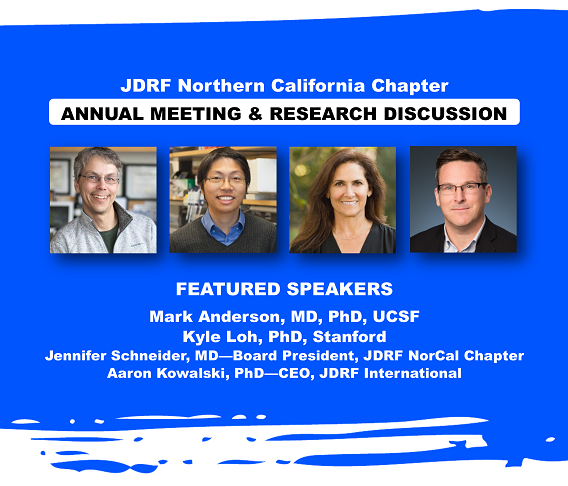
JDRF Northern California Chapter Annual Meeting & Research Discussion
February 28, 2023, San Francisco, CA
5:30 pm
Free
Join us at The City Club of San Francisco for the JDRF Northern California Chapter Annual Meeting & Research Discussion. The event will feature a chapter and organization update, followed by a panel research discussion with Mark Anderson, MD, PhD, Professor, Diabetes Center, UCSF and Kyle Loh, PhD, Assistant Professor of Developmental Biology (Stem Cell), Stanford; moderated by Aaron Kowalski, PhD, JDRF’s CEO. This event is free. There will be no activities provided for children at the event. Speaker bios are below.
Schedule
-
5:30 Check-in
6:00-7:30 p.m. Chapter and Organization Update, Research Discussion
7:30-8:30 p.m. Reception (drinks and appetizers)
Venue
City Club of San Francisco
The City Club of San Francisco: 155 Sansome St 10th floor, San Francisco
PARKING
345 California Street (Enter at 109 Battery between California and Pine streets) – 415.434.7743, Closes at 9pm
Sutter Stockton Garage, 444 Stockton Street (between Bush and Sutter streets) – 415.982.7275, OPEN 24 HOURS
St. Mary’s Square Garage, 433 Kearny (Between Pine and California streets) – 415.956.8106, OPEN 24 HOURS
CITY CLUB OF SAN FRANCISCO: 155 Sansome Street
San Francisco, CA 94104
Directions
Featured Speakers
Mark Anderson, M.D., Ph.D. is a Professor, UCSF Diabetes Center. He is a recognized expert in the genetic underpinnings of autoimmune diseases and the control of immune tolerance. The main research interest of his laboratory group is to examine the genetic control of autoimmune diseases to gain a better understanding of the mechanisms by which immune tolerance is broken. A major focus is a human autoimmune syndrome called Autoimmune Polyglandular Syndrome Type 1 (APS1 or APECED), which is classically manifested by an autoimmune attack directed at multiple endocrine organs. Mark received his doctorate in immunology in 1992 and his medical degree in 1994 from the University of Chicago, where he received the Distinguished Alumni Award.
Kyle Loh, PhD, is an Assistant Professor and The Anthony DiGenova Endowed Faculty Scholar at Stanford. He heads a laboratory that is generating pure populations of different types of human cells in a Petri dish from pluripotent stem cells. Their goal is to create a platform for stem cell-driven regenerative medicine. Kyle is a Packard Foundation Fellow, Pew Scholar, Human Frontiers Science Program Young Investigator, and Baxter Foundation Faculty Scholar, and his research has been recognized by the NIH Director’s Early Independence Award, Forbes 30 Under 30, Harold Weintraub Graduate Award, Hertz Foundation Thesis Prize and A*STAR Investigatorship. He was an undergraduate at County College of Morris and Rutgers University and received his Ph.D. from Stanford University.
Aaron Kowalski, PhD, is the Chief Executive Officer of JDRF International. He is an internationally recognized expert in the area of diabetes technologies and was a leader of JDRF’s Artificial Pancreas Research Project. Aaron was pivotal in the transformation of JDRF from an organization primarily funding academic research to a highly engaged strategic funder influencing all stages of the research and development pipeline. He combines his professional experience as a scientist with his personal experience of living with type 1 diabetes (T1D) since the age of 13, along with his younger brother who was diagnosed at the age of 3, to help guide and champion JDRF’s programs.
Jennifer Schneider, MD, currently serves as President on the JDRF Northern California Chapter Community Board, as well as on the JDRF International Board of Directors. She is the President & Chief Medical Officer of Surf Bio, a preclinical biopharmaceutical company leveraging a novel biotechnology platform to develop enhanced therapeutic solutions for diabetes, oncology, infectious diseases, gene therapy, and other therapeutic areas. She advises several early stage medical device companies and is a visiting scholar at Stanford. Jennifer’s daughter and husband both live with type 1 diabetes (T1D). Her husband developed T1D as an adult, and just a few years later their daughter developed T1D at the age of two.
More from the Northern California Chapter